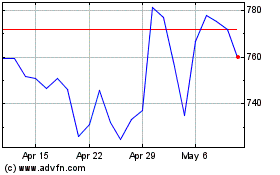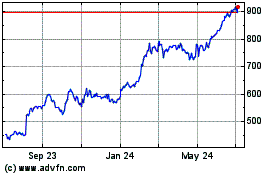FDA: Some Diabetes Drugs Can Cause Joint Pain
August 28 2015 - 4:00PM
Dow Jones News
The U.S. Food and Drug Administration said in a safety alert
Friday some widely used treatments for Type 2 diabetes can cause
severe and disabling joint pain, raising concerns for a big-selling
class of drugs.
The FDA alert applies to a category of pills known as DPP-IV
inhibitors, which include Merck & Co.'s Januvia, AstraZeneca
PLC's Onglyza, and Tradjenta from Eli Lilly & Co. and
Boehringer Ingelheim GmbH. Doctors prescribe the drugs, which hit
the U.S. market beginning in 2006, to help people with the most
common form of diabetes keep their blood-sugar levels in check.
The FDA said in the safety alert patients shouldn't stop taking
the drugs, but should contact their doctors if they experience
severe and persistent joint pain. Doctors should stop prescribing
the drugs to patients experiencing joint pain if the drugs are
suspected of being the cause, the agency said.
The FDA said it identified cases of severe joint pain associated
with the use of DPP-IV inhibitors in a review of medical literature
and adverse events reported to the FDA. Symptoms usually went away
after patients stopped taking the drugs, the agency said. The
agency added warnings and precautions about the joint-pain risk to
the drugs' prescribing labels.
Merck's Januvia has dominated the DPP-IV market and is the
company's highest-selling drug, generating about $1.9 billion in
sales for the first six months of 2015. A combination drug
containing Januvia, Janumet, had $1 billion in sales for that
period.
But prescription volume for DPP-IV inhibitors overall has slowed
in recent years due to new competition from other diabetes drugs,
as well as occasional safety concerns. One of the drugs, Onglyza,
was associated with an increased risk of hospitalization for heart
failure in a clinical study. In April, an advisory panel to the FDA
recommended that new warnings be added to Onglyza's prescribing
label about the heart-failure risk.
A spokeswoman for Boehringer Ingelheim said the company and its
partner Lilly are confident in the benefit-risk profile of
Tradjenta and combination drugs that contain it. There were no
significant differences in rates of joint pain between Tradjenta
and placebo in clinical trials of the drugs, and there have been a
"limited number" of reports of serious joint pain among users since
they reached the market, the spokeswoman said.
A Merck spokeswoman said severe joint pain is a rare occurrence
reported in a small number of patients taking Januvia-containing
drugs. She said Merck worked with the FDA in its review, and the
company is confident in the safety profile of Januvia. An
AstraZeneca spokeswoman declined immediate comment.
Write to Peter Loftus at peter.loftus@wsj.com
Subscribe to WSJ: http://online.wsj.com?mod=djnwires
(END) Dow Jones Newswires
August 28, 2015 15:45 ET (19:45 GMT)
Copyright (c) 2015 Dow Jones & Company, Inc.
Eli Lilly (NYSE:LLY)
Historical Stock Chart
From Mar 2024 to Apr 2024

Eli Lilly (NYSE:LLY)
Historical Stock Chart
From Apr 2023 to Apr 2024
